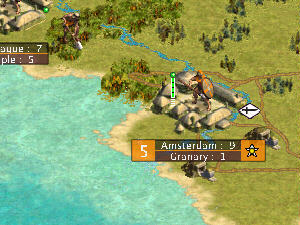Sunday 4 January 2004

|
Pic of the day: The Dutch are both Agricultural and Seafaring. They don't seem to be doing exceptionally well so far ... but then again it is still late Bronze Age. Civ3 Conquests: New goodiesI included a subtle hint in Friday's rant, but it probably didn't register except for other proud owners of Civilization III: Conquests. Yes, the "fascist militia" thing. One of the least expected additions to this expansion pack was two new forms of government: Feudalism and Fascism. Civ3 had eliminated Fundamentalism, a favorite from Civ2. In all fairness, Fundamentalism was overpowered: Free support of ten units per city, no unrest or corruption, tithes from temples and from other happiness improvements. Half research might be a setback, but not if you had spies or conquered cities now and then. To top it all, Fundamentalism was a "modern" form of government, so you got no reduction in resource harvesting like you did in despotism. Fascism is more balanced. You get no war weariness, like in despotism; highly productive workers, like in democracy; and full resource harvest like in monarchy. Just like in the real world, fascism is best for wartime. In the long run, democracy is likely to win out because it has the game's strongest economy. If you survive that long, that is. In solo play, you are likely to find much of the world ganging up on you. This is where a productive militaristic government looks tempting. For the peace-loving regent there is the new government of feudalism. Feudalism has been there as a prerequisite for pikemen and Sun Tzu's War Academy; but this is the first time as a form of government, which is closer to what it really was. In this medieval government, you are the nominal head of state but your cities are ruled by feudal lords. They resent putting their local troops under your command, so military is expensive and war weariness is a problem. On the very bright side, there is no upkeep for city improvements! Builder's paradise. Also, corruption is moderate ... having local lords helps to keep in check unruly elements that live far from the palace. Seems a great government for a cooperative multiplayer game, not that I imagine this happens very often. Lies, all lies! Feudalism was changed before the game was finished, and now has full upkeep for city improvements and high corruption. It is now an inferior form of Monarchy, only possibly useful if you have very small towns, as these have a higher upkeep-free military than larger cities. (!) ***The agricultural civilization trait looks less impressive than I first thought. Yes, you get an extra grain in your city square, but only if you build next to a river. This is definitely a bonus if your starting position is next to a river, as it usually is (but not always). The obvious use is to grow faster, but I notice that the Dutch AI used it differently: It placed a citizen on a forest square instead, so got normal growth but one extra shield. Thus, faster production of the first units. That's certainly also a possibility, especially since I play with Raging Hordes of barbarians. But over time, the grain bonus shines less brightly. Often you can get more than one extra food (or shield) by choosing a starting location with bonus resources, like cattle or wheat. Admittedly bonus resources don't do much until you get out of despotism, while the agricultural bonus works from the start. And you get a construction rebate ... on aqueduct, recycling plant and solar plant. What? If you did build next to a river, you don't need and cannot build aqueduct. And the ecological city improvements don't show up until so late in the game that your victory or loss is pretty much decided already. Well, you also get a rebate on building the Pyramids. Compare this to religious civilizations, who not only get a rebate on all religious buildings, but also can change government in one turn all through the game. I know what I would choose. Seafaring has one trade bonus on city square if built on the coast. Again, this is easy to get otherwise by building near fish, for instance, but of course you can do both. More important is that you start with the ability to build a boat right away, and it is less likely to sink on deeper waters. Add a rebate on the Lighthouse and you are likely to have contact with a lot more civilizations earlier than your competition. This is generally a good thing. Especially civilizations that live far away, and so are not able to attack you effectively. Trading civilization advances all over the globe is almost as good as having the Great Library. A good choice now would be the Spanish, Seafaring & Religious. Trading scientific advances all over the globe will lead the whole world to develop faster, but only religious civilizations can easily and instantly make use of the higher forms of government; others will suffer a transition period of anarchy, delaying them and making them vulnerable. Of course, accelerating world scientific development is not without risks, as some civilizations (the Americans come to mind) have stronger units in the endgame. Also an industrious civilization will be able to produce more of the new advanced buildings and units faster. More testing is in order... "More Civ than ever"! |
Yesterday <-- This month --> Tomorrow?